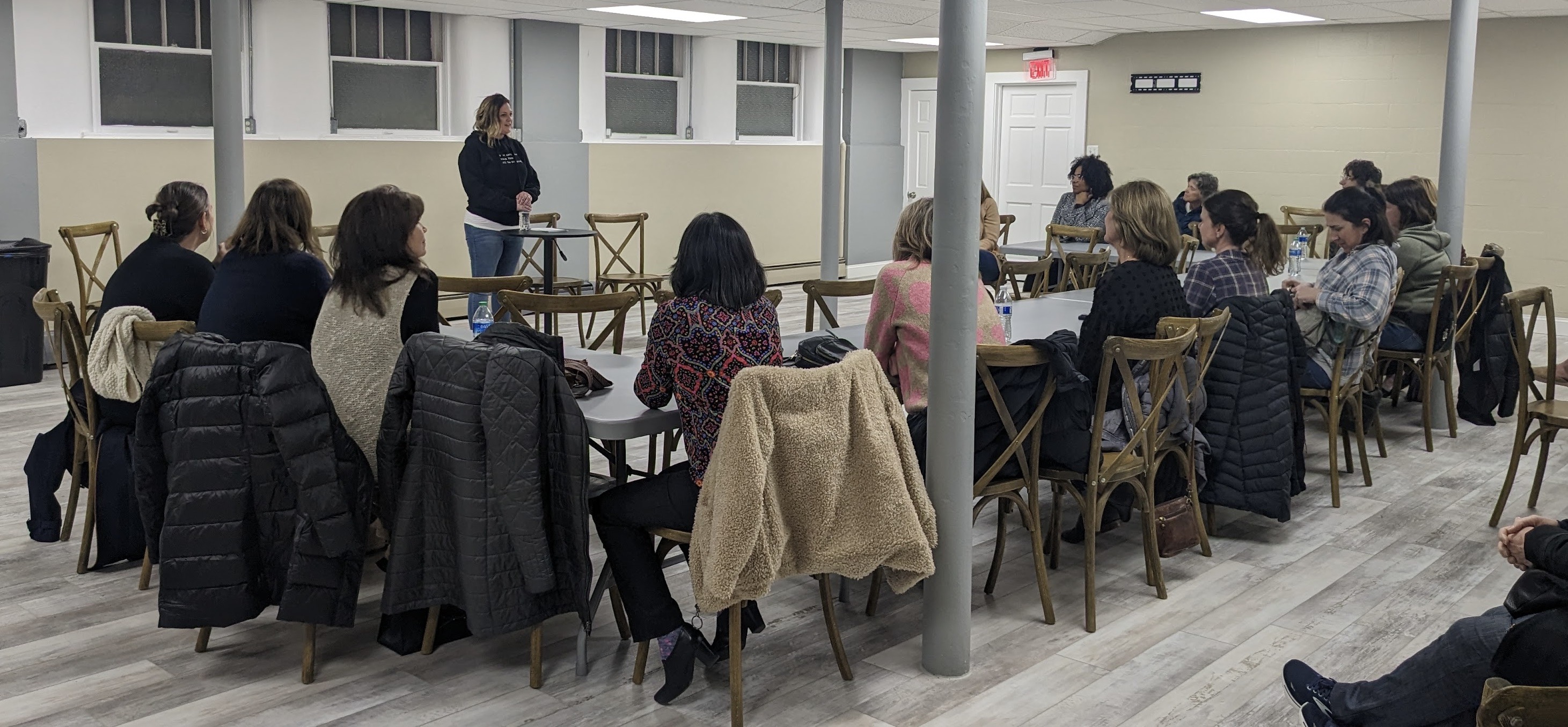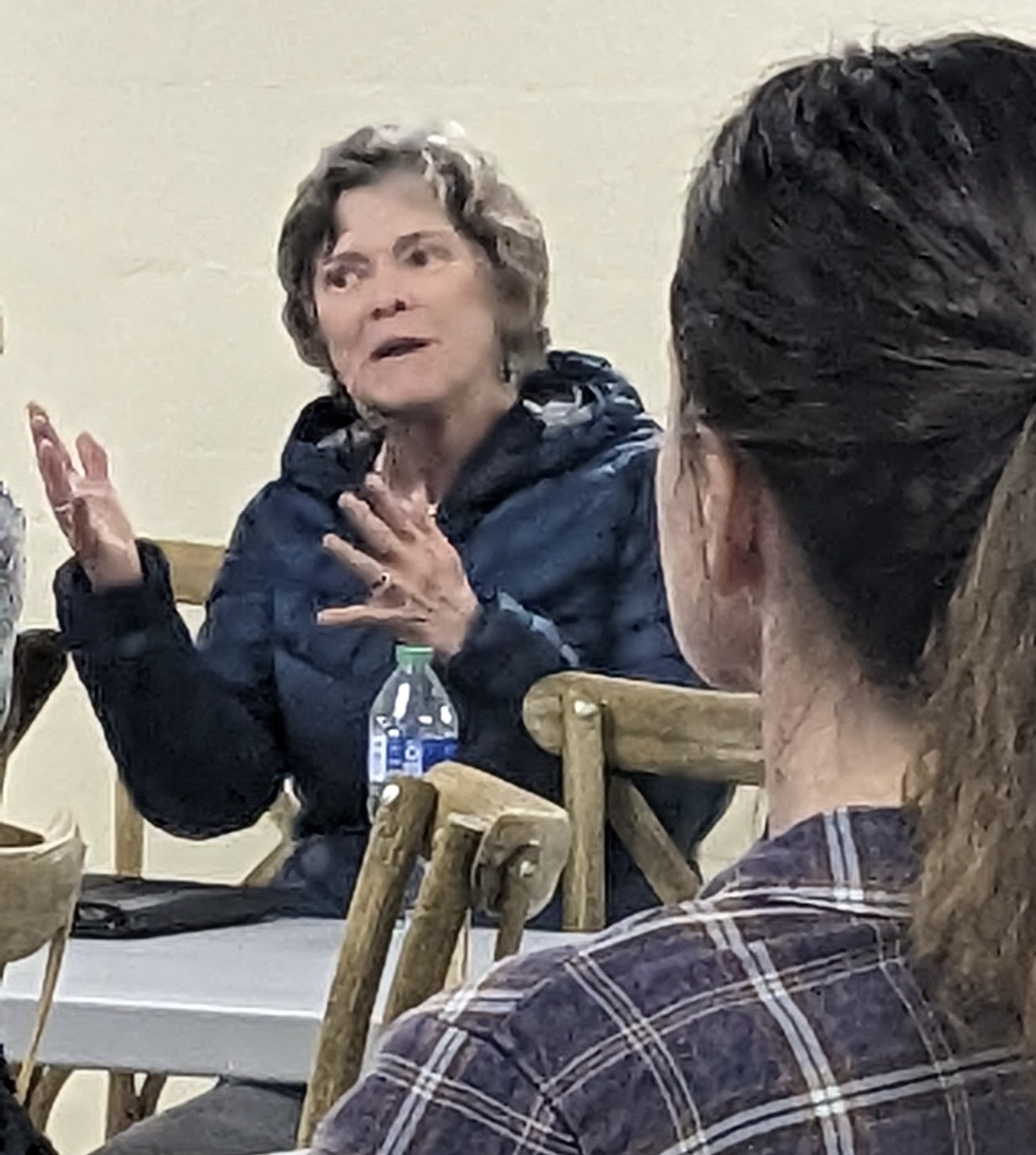Beth Clark
Twenty plus members of Impact Central Illinois gathered at Cana in Washington on March 7, 2023 for a discussion about Addiction.
Heidi Kessener wrote an insiteful summary below.

“Nobody wants this.” Camilla Rabjohns, Founder and President of Invictus Woods, speaks with conviction.
"It's a disease of the brain; nobody want this. We have to remove the anonymity - the stigma - of additionc. Cancer patients don't have to hide or beashamed."
Invictus Woods is a sober living extended care facility for individuals seeking an ongoing recovery program from chemical addiction. Camilla is a registered nurse and a National Certified Recovery Specialist (NCRS). She knows how important an extended care program is in developing maturity and stability after the initial recovery from addiction. She and her husband are both active in the local Al-Anon community, a support group for the family and friends of alcoholics, and frequently lead meetings. Camilla also travels to treatment centers and attends major conferences to continue learning.
Invictus Woods received a 2022 Inspire Grant from Impact Central Illinois, to be used for its Day One Scholarship Program, which helps to ensure that participants who successfully complete the 28-day residential program are set up for success, with a safe place to stay for the next 30 days. Several members of Impact Central Illinois have gathered at the Cana Event Venue in Washington, IL to hear from the Invictus Woods team.
“Camilla is great about building relationships with each participant,” offers Invictus Woods admin volunteer, Sally Owens. “And what’s greatabout having received the grant is that it’s kind of forced us to go even deeper with tracking participants after they leave the program.”
According to Addiction Relapse Prevention, by Nicholas Guenzel and Dennis McChargue, “One primary concern in addiction treatment is the high rate of relapses within a short period after even the most intensive treatment. Many studies have shown relapse rates of approximately 50% within the first 12 weeks after completion of intensive inpatient programs that often last 4 to 12 weeks or more and can cost tens of thousands of dollars.”
Sally reveals that in the experience of Invictus Woods, the first 24 hours are the most crucial for successful sobriety. “To be able to take a participant who has completed the in-house program, and to have a place for them to stay, and a way to get them there, that makes all the difference in the world,” she shares, referring to the Day One Scholarship Program.
“Oftentimes,” adds Camilla, “they’ll want to go home to ‘pick up a few things,’ but I say, “No! You go back there and I will never hear from you again!’” The passion in her voice makes it clear that she’s learned the hard way that relapses are much more likely if participants are returned to the places they were accustomed to using, and that she’s dedicated to “bringing out the best in each participant and creating new behaviors that promote lasting change” - just like the organization’s website says.
Even with the best tools at their disposal, Camilla and Sally know that relapses will happen.
“It’s not about the relapse. It’s about having the tools to wake up tomorrow and try again,” Sally advises. “Reinforce the tools. Be the one that helps them start again tomorrow.”
Impact members are also honored on this night to hear from a dynamic guest speaker from right here in Central Illinois. Pacing back and forth, she bravely details for us her personal story: the early childhood trauma that threatened to define her, the descent into substance abuse for relief from emotional pain, the journey through recovery, relapse and recovery again.
“I harbored so much hate for so long - which fueled my addiction,” she confesses, opening and closing her water bottle without taking a drink. “I just knew how to do drugs, not why I did them.”
Candidly answering the earnest questions of several members in attendance, our guest speaker emphasizes the significance of just being there for others, and listening with our hearts without lecturing or shaming.
“You’re not gonna do a lick o’ good for somebody that doesn’t care about you.” She straddles a chair. “Building a rapport is important, because they’re not gonna listen to you unless they trust you.”
Questions are called out from all corners of the room, and in many instances, the answer is the same: coping skills.
“I’m gonna compare it to drugs, because that’s what I know. Think about it like this: microdosing failure now versus flood-dosing it later. Wouldn’t you rather let your kids experience failure now? So when they’re out on their own, they can say, ‘I know what this is. I know what I can do.’ They need those coping skills.”
As the evening draws to a close, and so does our journey through her past, we come to the highlight of our time there. When asked what she would tell her younger self, she demonstrates by recounting what she’s done for her own children. She shows us how she takes what she’s learned from her own experiences and offers it to those in the community. Not only is she pouring this hard-earned wisdom into her children, into her children’s teachers, and into fellow addicts a step or two behind in the journey to recovery, but tonight, she is pouring into us, as well.
|
03/11/2023 11:37am A very interesting night of insights about addiction. Our guest speaker was honest and open about her journey and at the end she told us about her middle school son who might be addicted to video games. She told us about how she helped him get a handle on it and specifically talked about "Thought-Stopping", a technique I have used myself over the years. Check this out: https://thewellnesssociety.org/wp-content/uploads/2019/02/STOP-Technique-PDF-1.pdf |


